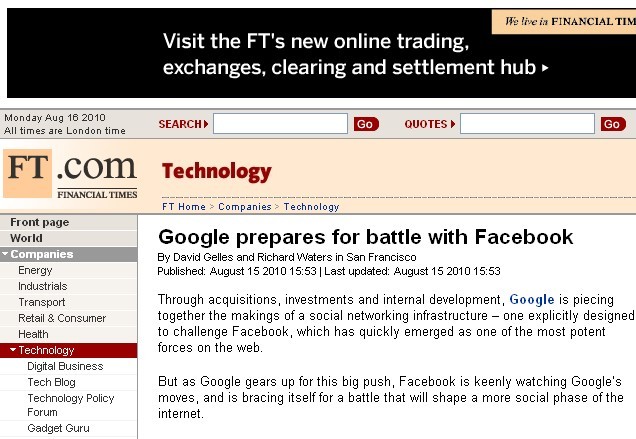金融时报:google看起来正在筹备与facebook角逐社交市场
通过收购、投资和内部研发,Google正在努力拼凑一个社交网架构,设计的初衷正是为了挑战Facebook,社交已经成为网络最大的增长点之一。
正当Google极力前冲时,Facebook却一旁敏锐地观察它的一举一动,它自抱成团,为再度塑造一个更社交的互联网而战。
Forrester Research分析师奥吉·雷说:“未来几个月,我们将看到Google做出更为紧密、更为明智、更为自信的社交攻势。它可能会真正对Facebook构成威胁。”
最显而易见的证据是Google的疯狂收购。上周五它宣布收购了Jambool,这是一家运行社交游戏虚拟货币软件的公司。同样在本月,它还花了2亿美元收购Slide。在此之前不久,它刚投资Zynga一亿美元。
一位接近Facebook的高管说:“它们内部创新失败,于是就将支票本扔进去。”
这些举动很明显是Google战略转移的信号。Google之前推出过Buzz,它试图从2亿Gmail用户中开拓出一个社交网。努力宣告失败,部分是因为隐私麻烦,同样也是因为Buzz功能有限,没有社交游戏和应用。一旦人们发现朋友在Buzz上,便不知还能干啥。
现在Google不再白手起家,它希望为游戏和应用建立最终站,然后将社交网团结在它周边。
产业专家们说,当Google推出新的社交网时,这种战略可能会赐予胜算,这个社交网可能叫做Google Me。同时给Google和Facebook提供建议的天使投资人Ron Conway说:“它们不是在购买市场份额,它们是在购买创意份额。它们在购买一些社交网上伟大的创意。”
Google之外,没有一个人知道到底Google Me的真容,而Google自己也暗示不会复制Facebook。最近,在《华尔街日报》采访施密特时问,是否会建立一个Facebook竞争网站,施密特说:“世界不需要同样东西的复制品。”
很明显,Google Me不会跟Facebook雷同,只是怀疑会相拟。熟悉计划的人内部人士说,Google的社交网包括两大元素:基于平台化的一系列应用程序和游戏。
在Google内部,该项目可以调用全公司的资源。不只包括5亿美元的收购,Google还将最优秀的人才集中于此项目。
经多方消息证实,Google工程副总裁维克·古多塔(Vic Gundotra)运营Google Me。在此之前他已经证明自己是强大的对手,它监管整个Android系统,并使之成功。
在Google还有另一件武器可以使用——它在搜索上的垄断地位。对于那些在Facebook上找人的网民,Google可以优先将Google Me的结果显示在其它结果前,哪怕这些结果来自Facebook。
接近Facebook的人士说:“唯一的担心是它可能会借用自己的搜索地位,从而影响到人们在社交网上所做的一切。它们曾经在财经、视频和地图上这么做过。”
Google全力进攻,它依然面临一个根深蒂固的网络:Facebook的5亿网民。
Facebook已经感觉到Google的威胁,它正在拥抱成团。最近几周,它刷新了一些核心功能,包括相册等。
Inside Network创始人贾斯汀·史密斯(Justin Smith)说:“试图创造一个产品和Facebook直接挑战,对Google来说有很多挑战。特别是当你有上百个朋友、有一生的生活的图片时,这种转换成本很高。”
在互联网广告上,Google依然是当之无愧的冠军,它拥有巨大的搜索广告,去年营收达235亿美元。Facebook不足其零头。不过Facebook才六岁,今年它的营收预期达到10-20亿美元,这主要是因为大量的用户和高度精准的广告。
数年来,两家公司为人才而竞争,用股票诱惑高级工程师。这种竞争已经演变升级。据消息人士说,为了防止Google印度两位高管跳到Facebook,Google开出30倍原报酬挽留。但这种方式没有管用,高管们将未来押在Facebook上。
Through acquisitions, investments and internal development, Google is piecing together the makings of a social networking infrastructure – one explicitly designed to challenge Facebook, which has quickly emerged as one of the most potent forces on the web.
But as Google gears up for this big push, Facebook is keenly watching Google’s moves, and is bracing itself for a battle that will shape a more social phase of the internet.
“We are going to see a more cohesive, confident and sensible social push from Google in the coming months,” says Augie Ray, analyst with Forrester Research. “And it comes at a time where there could really be some risk to Facebook.”
The most visible evidence of this fight is Google’s sudden shopping spree. On Friday it bought Jambool, a company that runs virtual currency systems for social games, including those played on Facebook. This month Google paid about $200m for Slide, a major developer of Facebook applications with a wealth of talented engineers. And shortly before that it invested $100m in Zynga, the largest maker of social games.
“They failed to innovate on their own so now they’re throwing their chequebook at it,” says a senior executive close to Facebook.
These moves signal a strategic shift for Google. Its previous social networking effort, Buzz, tried to summon a social network from the roughly 200m people who use its Gmail service. That effort flopped, partly due to privacy concerns, but also because Buzz had limited features, and no social games or applications. Once people found their friends on Buzz, there was little else to do. Now, rather than try to build a social platform from scratch, Google looks to be building a destination for social games and applications, and hoping the social network will coalesce around it.
Industry veterans say this strategy should give Google a fighting chance when it launches its new social push, which is likely to be called Google Me.
“They’re not buying market share, they’re buying mind share,” says Ron Conway, an angel investor who has advised both Google and Facebook. “They’re buying some of the great minds in social networking.”
No one outside Google knows exactly what Google Me will look like, and the company has suggested it is not out to duplicate Facebook. Recently questioned by the Wall Street Journal over whether Google was creating a Facebook rival, Eric Schmidt, chief executive said: “The world doesn’t need a copy of the same thing.”
But the broad strokes are coming into focus, and it is clear that if Google Me is not exactly the same thing as Facebook, it is suspiciously similar. People familiar with the plans say that Google’s social push is likely to include two elements – a suite of applications and games, based on some sort of platform.
Within Google, the project is commanding the company’s full resources. Besides spending nearly $500m on acquisitions, Google is putting its top talent on the case.
Vic Gundotra, Google’s vice-president of engineering, is running Google Me, according to multiple sources. Mr Gundotra has already proved himself a formidable adversary.
Until this reassignment, he was overseeing Android, Google’s mobile phone operating system that last week overtook Apple’s iPhone as the market leader in US smartphones.
There is another weapon Google might wield – its dominance in the search market. People close to Facebook are concerned that a search for a person in Google could deliver their Google Me profile ahead of other results, including their Facebook profile.
“The real worry is that they will leverage their position in the search market for whatever they do in social,” says one person close to Facebook. “They already did it in finance and video and maps.”
For all Google’s muscle, it faces a deeply entrenched network. With 500m members and counting, Facebook is the largest social network on the web.
And Facebook, sensing the threat from Google, is bracing itself. In recent weeks the site has refreshed core features including photo albums and posting to the news feed.
“There are substantial challenges for Google, or anyone, trying to create a product to compete directly with Facebook,” says Justin Smith, founder of Inside Network, which monitors social networking sites. “The switching costs are very high, especially when you’ve built up a network of hundreds of friends and made an archive of your life and photos.”
At stake is nothing less than the future of advertising on the internet. Google is still the undisputed champion of this field, serving up the vast majority of search advertising and hauling in $23.5bn last year. But Facebook is hot on its tail. Just six years old, Facebook is expected to make between $1bn and $2bn this year, thanks to its vast user base and its highly targeted ads.
For years, the two companies have competed for talent, luring top engineers with perks and stock options. But the heightened competition has taken this jockeying to new levels.
Google recently tried to keep two executives in India from joining Facebook by offering them 30 times their previous remuneration, according to a person familiar with the situation.
The offer didn’t work. The executives turned down Google, instead entrusting their future to Facebook.(source:financial times/sohu)









































